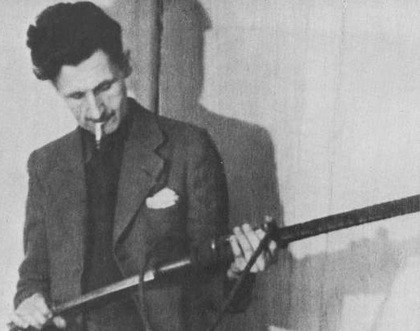Here’s an inspiring story about the power of literature to open minds and expand horizons. Essayist Dylan Nice describes how George Orwell’s fabulous “Shooting the Elephant” opened him up when he was a college freshman. I’ve taught the essay myself in first year composition classes.
Nice talks about himself at the time as close-minded and sure of his beliefs:
Freshman year of college I was a Republican hardliner and Pentecostal Christian. I had just graduated from an Appalachian public school where you could sometimes find teachers’ names written inside a textbook cover under the heading “issued to.” I had spent much of my childhood in backwoods revival services, in evangelical youth groups, trips to praise and worship services in stadium-sized venues. I called global warming a hoax and Al Gore a baby killer. I had come down out of the mountains with a wad of snuff in my lip and driving a high-mileage Ford. Somehow, I believed I would be a writer—not just a writer, but one who felt he’d saved himself from falling victim to lies through an uncomplicated narrative of persistent belief. I sensed truth was a fragile thing and once found, could only be kept alive through abidance. I was certain the new Iraqi war and all that ugliness could only be lost if we decided we wanted to lose it.
Something happened, however, when Nice encountered the Orwell essay in a remedial writing class (probably English 100). The essay is an autobiographical account of how Orwell, when a lower government functionary in Burma, had to confront an elephant that had gone rogue and killed a man. When he got to the elephant, however, it appeared to have become peaceful again. Orwell didn’t want to kill it but felt that he would lose face before the natives if he did not. In the end, it was their pressure that prompted him to kill the animal, which undermined his confidence that the British were in control.
Here is Nice describing the essay’s impact:
“When the white man turns tyrant,” Orwell writes, “it is his own freedom he destroys.” The elephant is shot through many times but dies slowly and its bones are picked over for meat. This was not my first encounter with truth, but it was my first encounter with this kind of truth. The essay was a twenty-minute read, but afterward the eighteen-year-old me was agitated, unnerved, ready to condemn Orwell for not being a braver man. I’d been raised in a culture that believed the world would be much simpler if the elite left quit trying to make it complicated. But here was an essay written by a troop on the ground in a seventy-year old occupation, who acknowledged the systems of control were far too complicated to remain wise, let alone noble.
Nothing changed for me immediately. I’d still vote for George W. Bush later that fall; still accuse democrats of being secret communists. But the subtlety of Orwell’s perception, his ability to recognize contradiction, irony, absurdity, had dug in somewhere deep and given me an intellectual inferiority complex. The writing was incisive, devastating without being pretentious or alienating. I trusted his telling of it, his voice. He says in the essay he knew the proper thing to do would be to approach the elephant and gauge its behavior. “But I also knew I would do no such thing,” he writes. “I was a poor shot with a rifle and the ground was soft mud into which one would stick at every step.” I was a hunter and familiar with being a poor shot. I could see the elephant in the distance, feel the crowd behind me, watch myself load the shell in the chamber, my hands shaking. I understood Orwell was a man who did not want to act rashly, who considered each party involved, knew there was no real urgency in killing the elephant, but killed it anyway because the inherent inadequacy of the individual in a world of larger, wealthier, more powerful forces.
It makes sense to me that Nice, given how he describes himself, would find the essay compelling. In some ways, he is in the same position as the young Orwell, who describes himself at this age as an unthinking agent of British colonialism. (It’s hard for me to imagine Orwell being quite so unthinking so he may present himself this way for dramatic effect.) His shift in awareness is also Nice’s shift.
Some on the right have accused liberal college professors of brainwashing their students, and I suppose they might see Nice’s conversion story as the dangers of exposing students to multiculturalism. But we teachers want our students to become independent thinkers, and we are willing to let the political chips fall where they may. Most of us believe, with Thomas Jefferson, that an informed citizenry is the country’s best hope and we don’t want our graduates opting for simplistic explanations and solutions, whether rightwing or leftwing. In any event, a propagandistic approach on our part is self-defeating as unthinking leftists can easily become unthinking rightists.
Nice doesn’t say whether he went on to vote Democratic (although it sounds like his politics shifted), but he clearly has become someone who understands that life is filled with “contradiction, irony, absurdity.” Orwell’s essay gave him powerful tools for negotiating his way through a complex world, and once he saw the new horizons opened up by critical thinking, he never wanted to go back.
(Thanks to Andrew Sullivan for alerting me to this article.)



One Trackback
[…] “An inspiring story about the power of literature to open minds and expand horizons.” I also plan to read Orwell’s essay that is referenced. […]